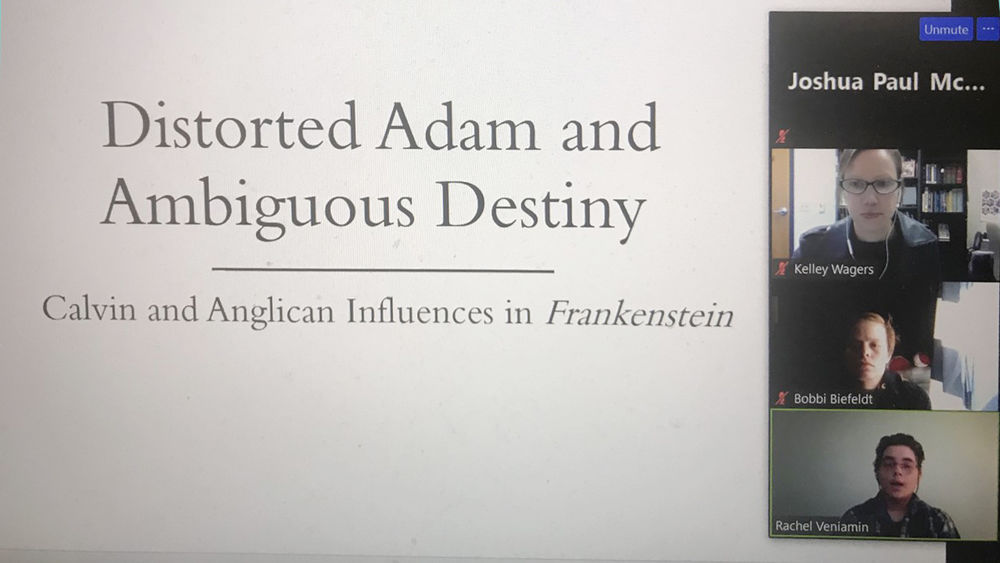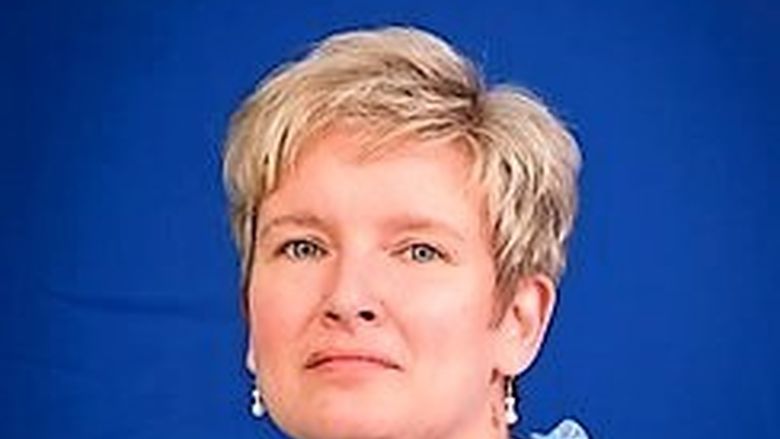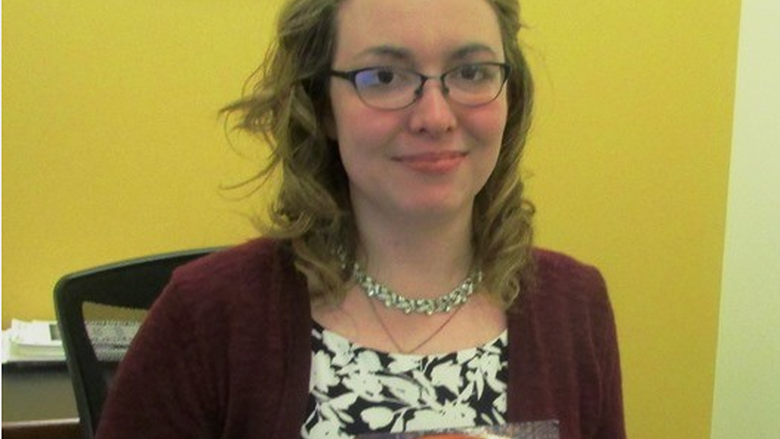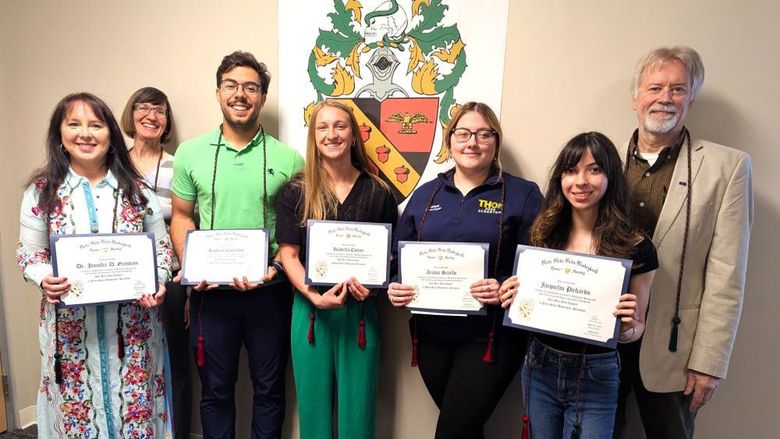
DUNMORE, Pa. – One of the primary missions of Penn State Scranton’s bachelor’s degree in English is providing students with the tools to become accomplished literary scholars. No doubt, the program is meeting the challenge, judging by the first-rate work showcased at its yearly English Senior Symposium.
The English department recently hosted its seventh annual Senior Symposium as a two-day virtual event on Zoom. This year, seven senior English majors gave oral presentations on their final research projects, which as usual covered an array of fascinating topics.
The presenters were:
- Bobbi Lee Biefeldt: "The Dark Arts of Disinformation"
- Micah Cameron: "Victor Frankenstein and the Crippling Effects of a Fear of Failure"
- Juliet Falcone: "Elizabeth vs. Elizabeth"
- Julia Fessenden: "'Being Related Doesn't Make Us Family': An Examination of Found Family"
- Gabby McFey: "The Role of Music in H.P. Lovecraft's 'The Music of Eric Zann'"
- Nicole Regni: "Into the Mirror: Doubling in Edison Studio's ‘Frankenstein’"
- Rachel Veniamin: "Distorted Adam and Ambiguous Destiny: Calvin and Anglican Influences in ‘Frankenstein’"
Both sessions were well-attended by faculty, students and staff, and included lively Q&As that allowed presenters to further elaborate on their work.
“The symposium draws attention to what we do in the English major and what students can do with it. That's important for us, as it is for humanities departments everywhere, so we can keep playing our crucial part in higher education and grow,” said Associate Professor of English Kelley Wagers, the symposium’s coordinator. “I also think the symposium is important within our English department because it lets us connect on an intellectual level. The students' presentations are so inspiring and engaging that we really talk and get excited about ideas and scholarship with each other and with the students. It's easy to get caught up in scheduling and advising and committees, which are all important too, but this is something different.”
“To see the students’ progress makes us feel great to be educators and a part of our wonderful program,” added Assistant Teaching Professor of English and Program Coordinator Paul Perrone.
Several students decided to focus their research on themes found within Mary Shelley’s “Frankenstein,” which has had a resurgence in popularity since 2018, the 200th anniversary of its publication.
Veniamin’s project examined the religious overtones in “Frankenstein,” specifically in relation to the concepts of predestination and free will.
Veniamin appreciated every aspect of her research project, from the presentation to all of the work leading up to it.
“Dr. Wagers was instrumental in leading us through the research process. We studied and discussed how to start with a research question and how to begin the search for answers in many complex, multidisciplinary sources,” Veniamin said. “From there, we began drafting and editing our drafts until we were happy with the finished product. Throughout the drafting process, we also studied and discussed literary techniques that we might use when crafting the language of our essays.”
"The symposium put the perfect capper on all that hard work."
-- Rachel Veniamin, English major at Penn State Scranton
“We labored over crafting a high-quality research paper, and the symposium allowed us to share the fruits of our labor. Even more than that, it allowed us to share the excitement we felt when we were researching and writing our papers,” Veniamin said.
"The symposium put the perfect capper on all that hard work," saud Veniamin.
Biefeldt also used “Frankenstein” as the inspiration for her project, which looked at the corrosive, polarizing effects of disinformation, both in the novel and in its current-day application on social media.
“Having the opportunity to give a panel presentation was terrific,” Biefeldt said. “At first, it seemed a bit daunting. However, it was a difficult but amazing experience to put together a longer research project. Then, to have an opportunity to present it to a panel, and have it be received well, really helped boost my confidence level as a potential writer. The English program as a whole has helped me build the confidence and skills needed to become a better writer.”
Among those in attendance for the symposium’s second day was English program alumnus Daniel Rosler, who just completed his master’s degree and in the fall will begin work on his doctorate in the literature and social justice program at Lehigh University.
Looking back on his own symposium experience, Rosler said the rigor and intellectual stimulation that came with the work prepared him well for graduate school.
“Over the course of the semester leading up to my own senior symposium, and with the invaluable help of Dr. Wagers, I learned how to conduct better research, apply that research to my argument, and condense my longer paper into an appropriate length for a presentation. I use these skills all the time, especially as I prepare now to present my master’s thesis,” Rosler said. “I also think that both the symposium and the prep work students do over the course of the semester are really gratifying experiences on a personal level. Dr. Wagers helped me grow and have confidence in my voice, and I loved having a space to share my work and listen to my colleagues’ wonderful and inspiring projects.”
For Wagers, one of the prime benefits of the symposium is seeing how many members of the campus community come out to support the students.
“One of my favorite things is knowing that this literal show of support -- this clear ‘yes’ -- from all corners is a memory our graduates take with them as they move on in their careers and lives,” Wagers said. “For the students, I think they benefit from the chance to stand behind their ideas and hear that they matter to other people. If they're headed to grad school or law school, they'll already have experience doing that in a professional academic setting. But English majors also go into business and nonprofit work, journalism, other kinds of media, politics -- you name it. No matter what, they'll be the communicator on the team, so practice doing that well orally as well as in writing is key.”
As Rosler sees it, the symposium is a fine testament to the English program’s overall high quality.
“I cannot emphasize this enough -- my experiences in the English program at Penn State Scranton changed the course of my life,” he said. “I don’t think enough people in the surrounding communities properly realize that we have a team of intelligent, compassionate scholars, trained in something as important as the humanities, practically teaching in our backyard -- not to mention the librarians, who are also fantastic. I’m loving my time at Lehigh University, and I can’t wait to continue at Lehigh for my Ph.D., but my experiences at Penn State were foundational.”





